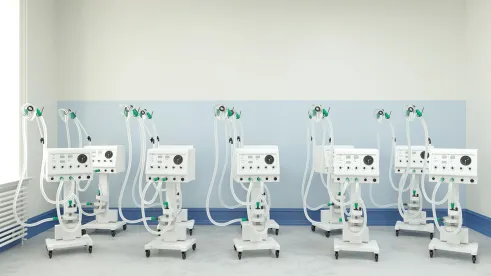This is not to suggest that there is anything wrong with the ventilators currently being manufactured by nontraditional manufacturers of ventilators for the purpose of combatting the COVID-19 national public health emergency. The question is posed because not every medical device always works perfectly, and sometimes medical devices do cause injuries. It cannot be ignored that the ventilators currently being produced pursuant to U.S. Food and Drug Administration emergency use authorizations (EUAs) are being manufactured by companies that don’t normally make such devices, and the FDA has effectively waived any requirement that such devices be manufactured pursuant to federal regulations setting forth good manufacturing practices.
The Public Readiness and Emergency Preparedness (PREP) Act provides immunity to companies that design or manufacture medical devices, also known as “countermeasures,” to combat, cure, diagnose or treat a disease that has been declared a public health emergency. The immunity provided is quite broad and would protect any company making the devices or components used in the manufacture of these devices so long as they are approved via the emergency use authorization process and used to combat, cure, treat or diagnose COVID-19. The Health and Human Services authorization that triggered the PREP Act effectively sunsets in October 2024, unless extended.
In response to the issuance of the EUA for ventilators, automakers and others have applied for, and received, permission to manufacture and sell ventilators to third parties who need them to treat patients with COVID-19. Many already have sold ventilators and others are in the process of manufacturing them with the hope of selling them as soon as possible to fight the pandemic.
Limitations in Time and Scope
While the PREP Act offers broad immunity to those that qualify, it contains significant limitations in both time and scope. Medical devices created to fight COVID-19 that are still in use after October 1, 2024, may not receive this protection. Medical devices created for the purpose of fighting this pandemic but are used for other medical treatments also may not enjoy this immunity.
So what happens to the automaker-manufactured ventilators that remain in use after October 2024? Presumably, some of them still will be available for use by COVID-19 patients and others who may need ventilators for a different reason. Also, what if these ventilators are used with non-COVID-19 patients and something goes wrong and a patient is injured?
Under traditional product liability law, the product manufacturer may be liable for any defect in the manufacture of a medical device that causes an injury. If the ventilator is in use with a COVID-19 patient prior to October 2024, there is likely immunity under the PREP Act, a protection on which the manufacturers of these devices – including the automakers – and their lawyers would be expected to rely.
However, if the ventilators are not used with COVID-19 patients or if they are used after the PREP Act declaration sunsets, then there is probably no PREP Act immunity at all and these manufacturers may face the same liability challenges that every other life sciences product manufacturer faces – strict liability for any product defect causing an injury. Importantly, unlike life sciences companies, these automakers, for example, will not be able to point to the fact that their product was cleared or vetted in any meaningful way by the FDA. They also will not be able to demonstrate that they were required by the FDA to manufacture the ventilators while complying with strictly regulated good manufacturing practices. This means that some of the best defenses that most life sciences companies enjoy when defending themselves from product liability lawsuits – FDA approval and FDA regulatory compliance – effectively will not be available to these temporary ventilator manufacturers. A good plaintiffs’ lawyer representing a patient claiming an injury from the use of one of these devices will undoubtedly try to take full advantage of this fact in depositions and at trial.
What are these automakers and others to do? Many epidemiological experts believe that COVID-19 is not going away anytime soon and that an even larger problem will emerge in the fall and going into next year. Ventilators will remain in high demand, and although automakers will undoubtedly be seen as good corporate citizens in the fight against this national pandemic by retooling their manufacturing plants to generate a much-needed COVID-19 countermeasure, the PREP Act only offers a limited shield for them.
Imposition of a Use Restriction?
One thought is for the automakers and others to try to impose a “use restriction” on the ventilators that they sell to hospitals or other buyers. Under this method, any purchaser would be required to promise to use the ventilators only for COVID-19 patients and only until October 1, 2024, or until the public health emergency is declared to be over. In essence, the manufacturer would restrict use of the ventilators to fighting the COVID-19 pandemic – the very purpose for their manufacture of these medical devices in the first place.
Use restrictions are not particularly common in the medical device industry for sales of products to end users, but they are more commonly used and enforced in other areas, such as in the sale of software and products in the agriculture industry. See e.g., Altera Corp. v. Clear Logic, Inc., 2003 U.S. Dist. LEXIS 27176 (N.D. Cal. 2003) (enforcing use restriction on the sale of software); Agricola Baja Best v. Harris Moran Seed Co., 44 F.Supp.3d 974 (S.D. Cal. 2014) (enforcing use restriction on the sale of tomato seeds in negligence and product liability claims). Similar “field of use” restrictions are common for limiting the use of a product license in patent infringement litigation. For example, in Mallinckrodt, Inc. v. Medipart, Inc., 976 F.2d 700 (D.C. Cir. 1992), the U.S. Court of Appeals for the D.C. Circuit upheld a single-use restriction on a patented medical device.
It will be interesting to see whether automakers and others can employ effective use restrictions or some other legal mechanism to protect themselves from future liability arising out of their production of ventilators to fight the global COVID-19 pandemic. Otherwise, the adage “no good deed goes unpunished” may take a future toll on these good Samaritans and their insurers.



 />i
/>i

